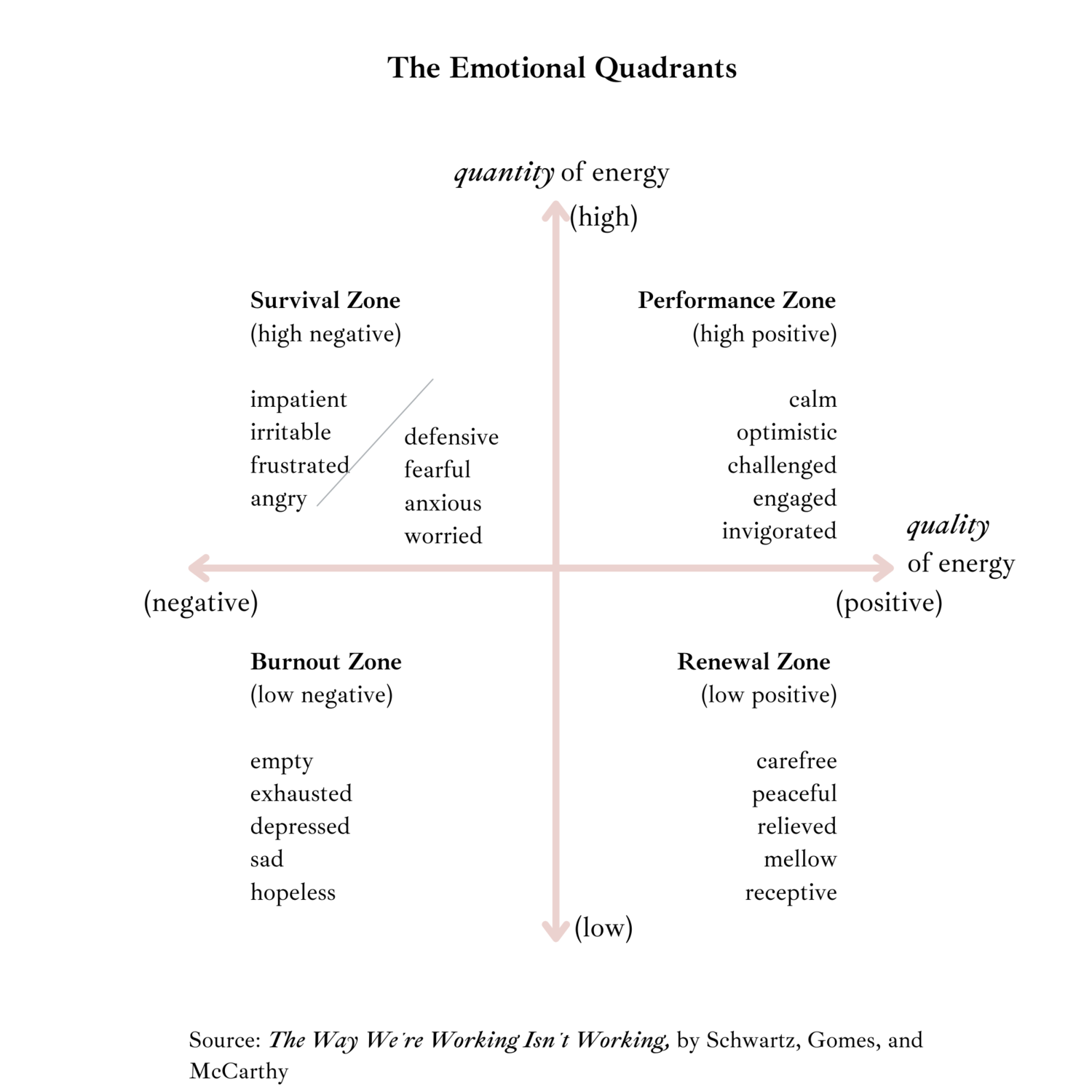My favorite model for how to manage your energy levels + focus
Today, I’m going to start with a chart. Take a look, and then we’ll talk.
This is from The Way We’re Working Isn’t Working, by Tony Schwartz, with Jean Gomes and Catherine McCarthy. It describes four emotional zones you can be in, while you’re working.
The implications of it might blow your mind.
…
Let’s start by talking about the Performance Zone — the upper right quadrant.
To understand the Performance Zone, think about how you feel when you’re performing at your best — working effectively towards a specific goal. If you’re like most people (and Schwartz’s team has asked this question of thousands of people — athletes, artists, heart surgeons, teachers, cops, and more) you feel:
Engaged
Focused
Upbeat
Committed
Optimistic
The Performance Zone requires a lot of energy, but you also have mostly positive emotion — hey, that’s how it feels to be doing a great job working towards a specific goal.
…
If you’re like many people, you saw the Performance Zone + thought: Yeah, that looks pretty good. I think I’ll just stay there all day at work and be really productive.
But there’s something very, very important to know about the Performance Zone:
You can’t spend all of your time there.
In fact, for most knowledge workers, Schwartz’s research suggests that you probably can’t spend more than ~90-120 minutes at a time in the Performance Zone.
Yes, even if you want to spent more time in the Performance Zone, your brain will literally kick you out.
Most knowledge workers don’t know this. They start their day feeling fresh — engaged, focused; classic Performance Zone; and just aspire to stay that way. But then their brains get tired…and kick them out.
Where do they end up?
Typically, they end up in the Survival Zone (upper left): feeling mildly — or significantly — irritable, reactive, anxious, or distracted.
Or — perhaps even worse — in the Burnout Zone (lower left): feeling exhausted, depressed, even hopeless.
…
This is where the story gets pretty juicy, in my opinion. Because even though you cannot stay in the Performance Zone, you can control which zone you go to next.
One of the key ideas in The Way We’re Working Isn’t Working is the idea of “pulsing.” When you reach your limitations with the Performance Zone, you can consciously choose to “pulse” to the Renewal Zone.
In the Renewal Zone (lower right), you are — you guessed it — actively cultivating renewal. You feel relaxed, peaceful, laid-back, and serene.
Typically, this requires stepping away from your computer for at least a 15 minutes and doing something that would allow you to feel mellow, receptive, or peaceful. Things like:
Moving your body (walking around the block, stretching, doing a workout)
Looking out the window
Reading an actual, physical book or magazine for 10 minutes
Having a relaxing meal
Chopping some vegetables
Folding your laundry while listening to harp music (hey, you asked for suggestions)
It’s important to note: email or social media usually aren’t Renewal Zone activities. Typically, you will be too revved up to actually feel peaceful + receptive. Here’s more on that, if you’re interested.
…
Are you feeling skeptical about this whole “pulsing to the Renewal Zone” thing?
For most of my clients, it takes some practice with pulsing to really get the hang of it. You might be so accustomed to being agitated in your body all day, that actually calming down your nervous system sounds, well, impossible.
This does improve with practice. If you regularly offer your nervous system the chance to come down, it begins to learn how to relax.
And, even then, you may not get to “spa day” in your pulse to the Renewal Zone. But that’s okay.
Even a mediocre trip to the Renewal Zone is way, way more useful to you than the Survival or Burnout Zones. And once you’ve spent a bit of time in the Renewal Zone, you can — you guessed it — pulse back to the Performance Zone.
And, if you feel guilty about visiting the Renewal Zone during your workday? Read this.
…
Want the three-sentence summary?
1. Stop trying to work for more than 90 (or maybe 120) minutes at your knowledge-work job.
2. You’ll be more productive, paradoxically, by taking a renewal-oriented break.
3. (Instagram or email checking don’t count as a renewal-oriented break.)
…
Does this feel obvious? Impossible to implement? I’d love to hear!
As always, I’m rooting for you. You’ve got this.
Katie
If this essay resonated with you, you'll love my newsletter. Sign up for free + get new ideas every Sunday!

